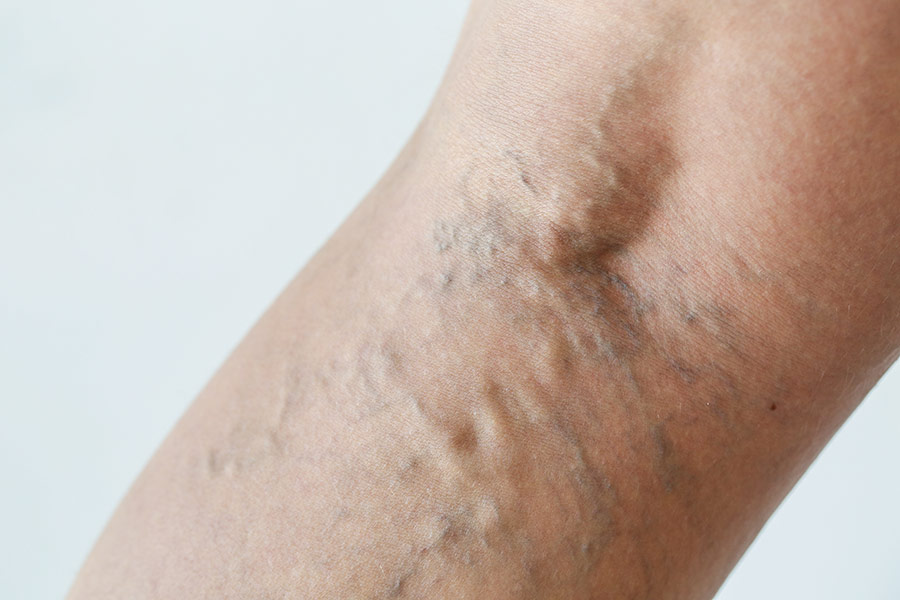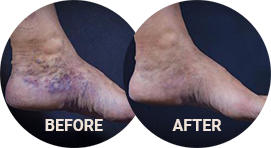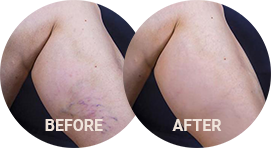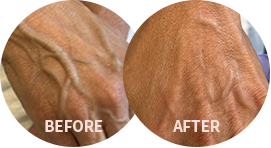Excessive alcohol consumption is a significant factor that puts our vascular health at risk. A healthy cardiovascular system is a necessity for a healthy life. And, according to CDC data, most U.S. adults don’t drink every day. However, two out of three adult drinkers drink above moderate levels at least once a month. (1) So what does that signal for the future health of our heart and our veins?

Although we don’t think of it as a chemical substance, alcohol is ethanol, the second most used recreational drug in the world after caffeine. (2) Doctors frequently warn of the dangers of drinking too much alcohol, and for good reason. In fact, if you ask a neurosurgeon how much alcohol is safe to drink, you may receive “zero” as an answer! So what steps can you take to reduce the risk of alcohol-related disease?
Dr. David Naar is a leading board-certified vascular surgeon. At Premier Vein Clinic, Westlake, OH, he provides patient education and counseling to live healthily and reduce the risk of venous disease. He also provides conservative treatments and minimally-invasive procedures to help patients with varicose veins, spider veins, and deep vein thrombosis. If you are experiencing health problems because of a vascular condition, call us at (440) 641-0433 or fill out a form to book a personal consultation.
Contents
The Cardiovascular System
The cardiovascular system’s role is to supply vital oxygen and nutrients to the body and brain so they function correctly. Its major components are:
- Heart – The powerful pump that perpetually beats to keep blood flowing around the body.
- Arteries – The vessels that transport oxygenated blood away from the heart to the organs and extremities.
- Veins – The vessels that transport deoxygenated back to the heart, completing the cycle.
Veins contain inner valves that help blood flow back to the heart and prevent backflow, however, these valves can stop working well, causing a condition called venous reflux, a symptom that contributes to a condition called chronic venous insufficiency (CVI).
What Are the Risks?
Whether you’re a fan of a glass of red wine with dinner, a round of frothy beers with your friends, or a nightcap of neat scotch, alcohol is a drink many of us enjoy, and many of us use, regardless of the occasion. However, the amount of alcohol we regularly consume could be contributing to poor health outcomes in the present, and in the future. Drinking alcohol in excess is a known factor in the development of diseases, including the following. (3)
- High Blood Pressure
- Heart Disease
- Stroke
- Liver Disease
- Cancer
The CDC officially recognizes that drinking in moderation reduces the risk of alcohol-related health problems for most people. But, the risks increase significantly with the amount of alcohol you drink. In fact, with certain diseases like breast cancer, even one drink increases the risk. (1)
Men vs. Women
Too much alcohol is bad for anyone. But physical differences can make it even more of a concern for women. Women and men’s metabolisms absorb and break down alcohol differently. This is because, generally, women have less body water than men of a comparable body weight. The result is that women experience higher blood alcohol concentrations after drinking the same amount of alcohol (4)
Of equal importance is that women, on average, actually drink less alcohol than men. However, the health implications of drinking alcohol are more serious for women who drink. Even when exposed to less alcohol than their male counterparts, women are more likely to develop physical illness, and cognitive and motor impairments as a result of drinking alcohol.(4)
But how does this relate to vein health? And why is it important?
Can Alcohol Cause High Blood Pressure?
Alcohol affects our bodies in many different ways. In the short-term, we may feel less inhibited, less able to maintain our focus or balance, and perhaps more likely to do or say something we later regret. We all know that “one-too-many” can turn a good night out into a disaster. But alcohol can also cause long-term problems, the effects of which may not be immediately apparent.
In the short and long term, alcohol affects the function of almost every major system in the body, including the cardiovascular system. Studies show that heavy drinking contributes to the development of high blood pressure (hypertension). (5) And, people with high blood pressure may risk developing varicose veins.
About Varicose Veins
Varicose veins in the legs are caused by abnormal blood flow. The valves in the veins cannot create a suitable seal to fight gravity and stop blood from flowing backwards. As a result, blood can pool, and veins can become twisted and swollen. This can become worse if blood pressure in the legs is too high.
Alcohol & Varicose Veins
Can drinking alcohol really make your leg veins swollen and purple? Scientists believe it could be a contributing factor for some patients. Although it is by no means the only risk factor, drinking alcohol increases the likelihood that you will develop varicose veins, especially in women. (6) This is because the female sex hormones, estrogen and progesterone can relax the muscles that aid blood flow.
Research points to a clear link between drinking alcohol and varicose veins, for both sexes. Although there are few studies that focus on these specific variables, one study indicates the development of varicose veins is significantly more likely in people who regularly drink alcohol. (5)
Drinking in Moderation
Take simple steps to improve your vascular health by limiting the amount of alcohol you drink. If you don’t know the guidelines for “moderate” drinking, the CDC website is a useful resource. According to their experts, drinking in moderation is defined as:
“Two drinks or less in a day for men or 1 drink or less in a day for women.” (1)
Bear in mind that one drink is considered one of the following.
- One 12 oz beer (5% ABV)
- One 5 oz wine (12% ABV)
- One 8 oz malt liquor (7% ABV)
- One 1.5 oz distilled spirit (40% ABV/80 proof)
Personal Consultation with Dr. Naar
Varicose veins, spider veins, and other uncomfortable and unsightly venous conditions can be difficult to manage without medical intervention. A personal consultation with Dr Naar allows patients a chance to show him the areas of concern in person so he can prepare the most effective treatment plan. To book your one-on-one appointment to discuss your vein health, call our Westlake, OH office at (440) 641-0433.
Varicose Vein Treatments at Premier Vein Clinic
Ambulatory Phlebectomy
Ambulatory phlebectomy is an effective vein removal treatment that involves a small incision in the skin. The procedure is suitable for people with or without uncomfortable symptoms of varicose veins, and can also be used to treat reticular vein formations.
Sclerotherapy
Sclerotherapy addresses spider veins, reticular veins, and varicose veins Dr. Naar injects a special solution called a sclerosant, or sclerosing agent, directly into the vein. This irritates the inner walls of the vein, causing it to collapse. It’s a minimally-invasive, accurate approach to vein treatment.
Radiofrequency Venous Ablation
RFA, or endovenous radiofrequency venous ablation involves ultrasound-guided RF heat energy directed into the vein. The sonic waves emitted by the device cause the vein to close. RFA is an alternative to techniques that manually remove the vein, such as ambulatory phlebectomy.
Endovenous Chemical Foam Ablation
Endovenous chemical foam ablation (CFA) uses a specially-prepared microfoam to reduce the appearance of twisted, unsightly varicose veins. CFA treatments are minimally-invasive, providing patients with a quick, easy procedure they can walk away from.
Cost of Varicose Vein Treatment in Westlake, OH
Dr. Naar will determine the cost of your treatment after he has performed a thorough physical examination and has discussed your treatment goals with you in person. To arrange your appointment to speak with him, and to find the most effective treatment for your varicose veins, call Premier Vein Clinic at (440) 641-0433, or complete a simple form to book with us.
FAQ
Can alcohol use cause high blood pressure?
Some studies suggest that heavy alcohol use is a contributing factor in hypertension cases. If you suspect you have high blood pressure, schedule an appointment with your doctor.
Will my varicose veins get worse if I drink alcohol?
The development of varicose veins depends on a number of different factors, including age, sex, whether or not you smoke, and even how tall you are. If you have varicose vein concerns, particularly if you are drinking more than two drinks (men) or more than one drink (women) in one day, speak to your doctor to discuss your vascular health and to discuss your concerns about your alcohol consumption.
References
- CDC. CDC – Fact Sheets- Moderate Drinking – Alcohol. Centers for Disease Control and Prevention. Published 2019. https://www.cdc.gov/alcohol/fact-sheets/moderate-drinking.htm
- Rajendram R, Preedy VR. 41 – Ethanol in Beer: Production, Absorption and Metabolism. ScienceDirect. Published January 1, 2009. https://www.sciencedirect.com/science/article/pii/B9780123738912000419#:~:text=Beer%20is%20brewed%20using%20malted
- CDC. Excessive Alcohol Use. cdc. Published 2019. https://www.cdc.gov/chronicdisease/resources/publications/factsheets/alcohol.htm
- National Institute on Alcohol Abuse and Alcoholism. Are Women More Vulnerable to Alcohol’s Effects?-Alcohol Alert No. 46-1999. pubs.niaaa.nih.gov. https://pubs.niaaa.nih.gov/publications/aa46.htm#:~:text=Women%20achieve%20higher%20concentrations%20of
- Ahti TM, Mäkivaara LA, Luukkaala T, Hakama M, Laurikka JO. Lifestyle factors and varicose veins: does cross-sectional design result in underestimate of the risk? Phlebology. 2010;25(4):201-206. doi:10.1258/phleb.2009.009031
- Antani MR, Dattilo JB. Varicose Veins. PubMed. Published 2020. https://www.ncbi.nlm.nih.gov/books/NBK470194/




